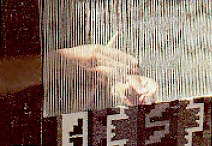COMING FULL CIRCLE -
A RETURN TO THE WEAVER'S WORKSHOP
by Kathleen Burhnam
The Table Mesa Workshop with Sarah Natani is returning to
the focus it has had in the past. It is a workshop for
weavers who desire to learn or improve on the Traditional
Navajo style of weaving.
I am a volunteer coordinator for this workshop. I believe
an introductory letter would be beneficial for the Natani
family, for ourselves, and especially for potential workshop
registrants so that the purpose of the workshop is clear:
this is a weaver's workshop, not a convenient excuse to take
a friend and vacation in the southwest. The Natani family
has graciously extended to us an opportunity to learn to
weave in the Navajo style while living on their land,
hearing their stories, and experiencing firsthand the
conditions under which they have endured and produced their
beautiful weavings, jewelry and pottery.
This workshop may not be for everyone. The weather can be
quite harsh, with cold winds, rain and lightning storms.
There is a hogan with the traditional dirt floor and coal
burning stove that can sleep approximately six people
comfortably. We recommend driving to New Mexico in a vehicle
you can sleep in, as tents have been known to blow over in
the soft, sandy dirt. The bathroom facilities consist of one
outhouse, which is shared by all of the weavers. If you feel
you must have a shower, you can bring a solar shower bag and
hang it in the outdoor shower stall. You are responsible for
your own breakfast and lunch, which you may prepare in the
hogan or at your vehicle or tent. Dinners are prepared by
Hannelore and myself for the workshop participants, the
Natani family, and guests, and are eaten in the Quonset hut
or, weather permitting, in the brush arbor. When the wind
dies down and the weather is sunny and warm, flies are
abundant. This is camping, not resort living. We live as the
Navajo live(d), however briefly and superficially, and in
this way we develop an appreciation for their
accomplishments, their enduring dignity, their grace and
beauty in the face of adversity, and we come away with the
glow of the southwest sunsets in our hearts.
Originally, all the weavers slept, ate and wove in the
Natani's first hogan. This was how the Navajo families
lived, and this was how the workshop participants lived.
Eventually, as the workshop evolved, people began varying
the sleeping arrangements, the meal preparation was pared
down to one communal meal a day, and Sarah and Leo
graciously allowed the weavers into their own hogan at night
so they could continue weaving, carding and spinning, and to
just relax and talk. To avoid misunderstandings that might
exploit Sarah and Leo's personal generosity or offend their
cultural heritage, what is--and is not--allowed needs to be
very clear to every potential registrant BEFORE the deposit
checks are sent in. Sharing the incredible beauty and
variety of experiences at Table Mesa provides the workshop
members with a very real and tangible sense of common
purpose and focus.
I look forward every year to returning to Table Mesa and
visiting with the Natani family. The sunsets and sunrises
are spectacular. The wide, vibrant sky is filled with fluffy
white clouds against an unbelievably blue background or
millions of tiny stars that go on and on, and the rush and
pull- and-tug of civilization quickly fades to the rhythms
of a simpler life. The field trips to the trading posts,
especially Two Grey Hills Trading Post, are fun and a great
diversion and treat after laboring all day with the
intricacies of Navajo weaving. There are opportunities for
trips into town on your own after the end of the day's
workshop activities. This is a wonderfully fulfilling
workshop if you can give yourself up to it and not have
unrealistic expectations.
I encourage anyone with a desire to learn about Navajo
weaving and the Navajo culture, and who can laugh at a few
minor discomforts, to sign up for the Table Mesa
Workshop with Sarah Natani. It is an experience you will not
likely forget.
|
Description
of the
Table Mesa Workshop for Weavers with Sarah
Natani
|




